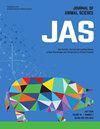35 1.3、1.6 β-葡聚糖酵母对宠物健康的益处
IF 2.7
2区 农林科学
Q1 AGRICULTURE, DAIRY & ANIMAL SCIENCE
引用次数: 0
摘要
近年来,1.3、1.6 酵母β-葡聚糖(BG)因其对人类和动物的多种健康促进作用而日益受到关注。酵母β-葡聚糖是一种多糖,以其免疫调节作用而闻名,已在各种动物模型中进行了广泛研究。特别是当这些多糖来自酵母时,它们能够训练先天性免疫系统,尤其是单核细胞和巨噬细胞,增强吞噬能力、细胞因子的产生和整体免疫反应。许多研究已经表明,1.3、1.6 酵母 beta 葡聚糖可以解决一些宠物健康问题,如牙周病、过敏症、骨关节炎、糖尿病等。在 Phileo,我们进行了一项试验,用专有的 1.3、1.6 β-葡聚糖酵母训练犬单核细胞和巨噬细胞,以确定犬吞噬细胞是否能从 1.3、1.6 β-葡聚糖酵母的训练中获益。我们的研究结果表明,在 1.3、1.6 酵母 BG 存在下培养的犬吞噬细胞会产生更多的肿瘤坏死因子 (TNF)α 和白细胞介素 (IL)-12 细胞因子。这些数据确实令人鼓舞,因为 IL12 是启动 T 细胞对病原体反应的关键。这些对抗病原体的益处表明,感染发生率降低,从而减少了对抗生素的依赖,提高了可持续性。我们将列举几个与狗关系密切的物种的例子。综合上述结果,在宠物食品或补充剂中添加 1.3、1.6 BG 酵母为增强宠物健康提供了一个前景广阔的途径。它们具有多方面的益处,包括免疫调节或炎症控制,使其成为宠物护理行业中极具价值的纯化活性物质。本文章由计算机程序翻译,如有差异,请以英文原文为准。
35 Beneficial role of 1.3,.1.6 yeast beta glucan in pet health
In recent years, 1.3, 1.6 yeast beta-glucans (BG) have gained increasing attention for their diverse health-promoting properties in both humans and animals. Yeast beta-glucans are polysaccharides known for their immunomodulatory effects, which have been extensively studied in various animal models. Especially when they are coming from yeasts, these polysaccharides exhibit the ability to train the innate immune system in particular monocytes and macrophages, enhancing phagocytosis, cytokine production, and overall immune response. A number of studies have already shown that 1.3, 1.6 yeast beta glucans can address several pet health specific concerns, such as periodontal disease, atopy, osteoarthritis, diabetes. At Phileo, we conducted a trial where canine monocytes and macrophages were trained with a proprietary 1.3, 1.6 yeast beta glucan to identify whether those canine phagocytes could benefit from the training by 1.3, 1.6 yeast BG. Our results show that canine phagocytes cultured in presence of 1.3, 1.6 yeast BG display a greater cytokines production of tumor necrosis factor (TNF)α and interleukin (IL)-12. Those data are really encouraging as IL12 is essential to initiate T cell responses against pathogens. These benefits against pathogens have shown reduced incidences of infections, subsequently reducing the reliance on antibiotics and enhancing sustainability. Several examples will be given on species close to dogs. Taking these results all together, the inclusion of 1.3, 1.6 yeast BG in pet diets or supplements offer a promising avenue for enhancing their health. Their multifaceted benefits, including immunomodulation or inflammatory control, make them valuable purified actives in the pet care industry.
求助全文
通过发布文献求助,成功后即可免费获取论文全文。
去求助
来源期刊

Journal of animal science
农林科学-奶制品与动物科学
CiteScore
4.80
自引率
12.10%
发文量
1589
审稿时长
3 months
期刊介绍:
The Journal of Animal Science (JAS) is the premier journal for animal science and serves as the leading source of new knowledge and perspective in this area. JAS publishes more than 500 fully reviewed research articles, invited reviews, technical notes, and letters to the editor each year.
Articles published in JAS encompass a broad range of research topics in animal production and fundamental aspects of genetics, nutrition, physiology, and preparation and utilization of animal products. Articles typically report research with beef cattle, companion animals, goats, horses, pigs, and sheep; however, studies involving other farm animals, aquatic and wildlife species, and laboratory animal species that address fundamental questions related to livestock and companion animal biology will be considered for publication.
 求助内容:
求助内容: 应助结果提醒方式:
应助结果提醒方式:


